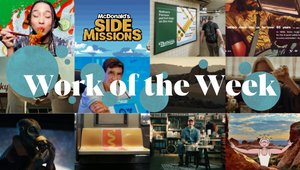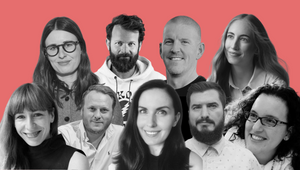
Bossing It: How You Can Be a Leader No Matter Your Role with Mark Watson

Mark is managing director, international marketing services with a focus on growth of people and the McDonald’s and Portfolio clients around the world (outside of the Americas), through building an inclusive, creative team where everyone can belong and grow.
Somewhat of a tms veteran, over his tenure, Mark has had the opportunity to work in multiple tms and Boxer offices around the world while working with some of the world’s biggest brands.
He has had leadership roles on the global team and held MD positions for the Chicago Agency, Boxer, and most recently was managing director, Europe – whose culture, business growth and creative recognition culminated in Campaign naming tms as ‘Best UK Place To Work 2020’, with them also naming Mark as UK ‘Agency Head of the Year’ for the same year.
Mark sits on the Advisory Board for the charity, Power the Fight, and the CEO Advisory Board of the Alliance of Independent Agencies, working with UK partners and charities to better understand and drive equity, inclusion and opportunity in the marketing industry and beyond – recently expanding his journey by appearing podcasts including the live, globally streamed, Fearless Futures podcast to discuss ‘Building Equity into our Products and Processes’ (series two, episode six).
Married, with two teenage sons (Monte & Ripley), the only thing he likes more than being an avid running, is talking about being an avid runner.
LBB> What was your first experience of leadership?
Mark> A boss of mine once bought me a book called, ‘The Education of an Accidental CEO’ (David Novak), and I feel that my path to leadership was somewhat similar. I ran a large team, yet I didn’t necessarily consider myself a leader until a client called me to congratulate the team (not me) on the job they were doing. It was then that I realised that if I was shining a light on others and facilitating them being successful – then I was probably beginning to become a leader. Leading in good times is relatively easy though. The next big reveal for me was being placed in charge of a failing business and standing in front of the 150 or so staff for the first time – seeing the look of expectation from the group, knowing that everyone’s livelihood was dependent on my actions, and having my plan and incisive decision-making put sharply in the spotlight with nowhere to hide.
LBB> How did you figure out what kind of leader you wanted to be – or what kind of leader you didn’t want to be?
Mark> Although becoming a leader was not a conscious plan, I have always taken the opportunity to read leadership books and attend conferences as often as I could. Yet I knew through any role I had, I wanted to lead with empathy and respect. I wanted to set the standards, be clear about the path, and then create the conditions for the team to be successful. I always refer to it as the ‘chief cheerleader and cheque writer’ role. Empathy and influence over fear and authority, every day of the week. To do that you must get to understand the business needs, and as quickly get to the core of each of the team. You need to grasp what way their roles are important to them, as well as to the business and then tap into that propulsion. This can then translate into mutual success.
LBB> What experience or moment gave you your biggest lesson in leadership?
Mark> Another boss - early in my leadership career - called me aside, to speak to me about a situation regarding a conflict I was trying to solve. He told me he “supported me 100%”. I said, “Thank You” and was ready to get back to it, but then he clarified that he supported me 100% but did not necessarily agree with me 100%. At that moment, I understood the importance of being there for my team, of seeing the positive in them, even when they are not faultless.
However, it’s the tough times that give the biggest lessons. Whether it’s navigating a path through the covid pandemic or going through restructuring – how you have behaved every day prior allows you to apply lessons learnt, as well as dictates whether the teams will put their faith in you. It’s this mentality in the everyday that sets you up when those major challenges arise, where you can show the confidence that whatever the hill, as a group you can get to the summit.
LBB> Did you know you always wanted to take on a leadership role? If so how did you work towards it and if not, when did you start realising that you had it in you?
Mark> I don’t think I set out to be a leader per se, but I knew I liked to galvanise others. Throughout my time at work, I’d often had people come to me for direction or ask for support. You don’t have to have the title to be a leader. You don’t have to be at the top of the pyramid. Being a leader is about your behaviour, your standards, and how you show up for others every day. You can be a leader no matter your role.
LBB> When it comes to 'leadership' as a skill, how much do you think is a natural part of personality, how much can be taught and learned?
Mark> I think it’s a mix. There is that personality piece, as I feel that being inquisitive and curious has put me in good stead. That’s nature. But, then there’s nurture in terms of what you do with that innate curiosity – whether you choose to learn more about people, about business strategy, delve into the financials and indeed how to lead. Taking the time to understand more about coaching, learning how to be an active listener and identifying the right time to apply that curiosity.
LBB> What are the aspects of leadership that you find most personally challenging? And how do you work through them?
Mark> You understand that as a leader you want to give your teams freedom to fail and learn, but I find letting people make mistakes tough. I know we will all learn from it – as long as you provide a safety rope – but I find it really hard to watch when I see it unfolding. This is where good coaching needs to come in.
On a more macro level, you can have a unique insight into where inequity hits society, the industry week-in-week-out and sometimes the business too. Changing these inequities is a hard journey that takes time and effort, and broad team buy-in. You have to be fully committed to fixing it as it is a relentless challenge. But as a leader, you are best placed to encourage and sometimes demand change, as you can set the tone and highlight progress, and be ready to commit the energy, focus and to the harder path that you will sometimes need to take.
LBB> Have you ever felt like you've failed whilst in charge? How did you address the issue and what did you learn from it?
Mark> Numerics are easy to measure. You know if you’ve hit the numbers, or the KPIs. But if teams fall short or you lose a pitch or clients aren’t satisfied, the important question for me is what else could I have done to have supported them, to have helped to create the conditions for success?
In ‘Good to Great’, Jim Collins talks about ‘the window and the mirror’. When there is success the first thing to do is look out of the window to see who contributed, how you can learn from it personally, and make sure you acknowledge those that made it happen. If something doesn’t reach the level needed, you look in the mirror and look at what you could have done differently. I am a fervent believer in this philosophy.
And then there are some times when things that you don’t directly control, yet happen ‘on your watch’, have negative impacts. For example, if someone raises a concern or complaint, if you’re at the top, you have to question what you missed, what signs you could have spotted, to ask yourself “Did you ignore that?”, consciously or otherwise? There are different types of failure to watch out for – financial failure, team failure, integrity failure. One constantly challenges and questions what you’re seeing and whether or not you’re connected enough to the details of the business to see things through other people’s eyes. This comes back to being an empathetic leader. You can’t know everyone inside out, but you do what you can to understand the dynamics of the group or the team – even if sometimes they try to escape you.
LBB> In terms of leadership and openness, what’s your approach there? Do you think it’s important to be as transparent as possible in the service of being authentic? Or is there a value in being careful and considered?
Mark> I’m definitely all for transparency and authenticity. Building trust and followership, and having people give you generous assumptions when needed starts with you being open and transparent with them. To me this means explaining decisions and giving additional context, fully explaining the rationale behind these decisions – especially when the team could be forgiven for being concerned with the implications. There are also times when you are the one that has to stand up for the group, maybe against a prevailing opinion – often to your own management or peers – and here your authenticity sets you in good stead to be heard against the flow.
I also try to be transparent about my own personality, about my whole self – I hope that my natural energy and desire to push creative boundaries rubs off on the whole business – yet it’s important to show vulnerability at times, too. There are times when the business looks to you to be the calm head and to lead through a difficult phase. There are times when you need to show an even keel, but this doesn’t mean you can’t also show this vulnerability. Resilience in the new world means showing how you use the people and tools around you to deal with challenges, which can be scary for everyone, including you, yet demonstrate the belief that you’ll get through. For that, there’s no need to avoid all emotions.
LBB> As you developed your leadership skills did you have a mentor, if so, who were/are they and what have you learned? And on the flip side, do you mentor any aspiring leaders and how do you approach that relationship?
Mark> My mentors have been a mix of bosses and coaches. I picked nuggets from each. I took the best bits of them, I hope, to mould me. But I am open to being mentored by all. Each year, when we do our 360 appraisals, I send out a request for feedback to the entire business. I want to hear their view of how I can be a better leader for them.
I invest time in mentoring others too: future leaders and emerging leaders. I try to impart to them the importance of creating their own definition of great leadership. Not saying, “This is how you do it”, but encouraging honest self-assessment and helping individuals to find their own ways of getting the best out of others and themselves, to take their own decisions – whilst holding on to that inquisitiveness and curiosity; always looking around at how other great leaders do it.
LBB> It's been a really challenging year - and that's an understatement. How do you cope with the responsibility of leading a team through such difficult waters?
Mark> Sometimes to define a clear path, the way through a challenge, you can consider the analogy of a sat nav. There may be a sudden build-up of traffic, or an unexpected incident, but if you know your destination, you can flip to a different route if needed. It’s important to make sure people know where the destination is, and the belief that, come what may, you will find a path.
And on that path show that you understand that the journey and challenges will be affecting people differently – depending on their circumstances, their experience and their reality. A great phrase I heard during the covid lockdowns was a challenge to the phrase “Well, we are all in the same boat”. No. We were all in the same ocean, but we were in our own boats.
LBB> This year has seen the industry confronted with its lack of action/progress on diversity and inclusion. As a leader how have you dealt with this?
Mark> We have been very transparent and published an agenda of the steps we were taking and the commitments we were making, so that we can be open and held accountable. You can’t relent. This is a constant focus for us and frames our way of thinking in every decision we make, where we choose to spend money, how we train, and where we look for talent. Beyond a metric, this is a way of thinking and challenging everything we do, through an inclusion and belonging lens. Being accountable, remaining approachable and feeding in that ability to course correct, while remembering that nobody has all the answers. There is no let up. It has to be relentless.
As a business we are actively looking for as ‘divergent’ a workforce as we can - ethnically, socio-economically, neuro-divergently, skill set, lived experience. This is especially important in marketing. We are trying to blow the traditional hiring path up, to show groups who may not have considered a career in marketing various pathways to the corporate world, to show that marketing is something they could consider.
LBB> How important is your company culture to the success of your business? And how have you managed to keep it alive with staff working remotely since 2020?
Mark> Building culture in the era of remote work is its own challenge. We’ve tried to create the office as a safe space, a place where people can come and work together, organically, face to face if that works for them. But different environments suit different people. For some their job and their team relationships form part of their identity and lifestyle, whereas others are more task oriented.
We are still learning and building Culture 2.0 – how it feels and operates with a fluidity of people in the office. For me, the heartbeat of our culture is still within that office location, the agency culture sits there, which remains important for those that want it. We have a significant number that choose to come in, but you are never quite sure who will be there on any given day, but the office is still at the heart of our culture, even if not everyone is there in person.
To remain connected as a group, we do a monthly online team update and have regular socials, like-minded ‘Vibe’ meetups, as well as full team, in-person, twice-yearly celebrations of the work and the people.
LBB> What are the most useful resources you’ve found to help you along your leadership journey?
Mark> I’m a great believer in learning from others. I’ve found that not just business books but also adventure books have important learnings of how to get teams through tough challenges. Books such as Wade Davis’ chronicle of George Mallory and his teams in ‘Into the Silence’, the team survival story of explorer Ernest Shackleton, or the path of Triathlete Chrissie Wellington. I have just read Kara Goucher’s ‘The Longest Race’ which delves into dealing with ethic violations and the personal and professional conflict surrounding how to deal with them. All of these journeys take bravery and critical decision-making to get to the endpoint.
You can get inspiration for leadership from anywhere. It’s important to mould your own version of being a leader, to tap into your own areas of interest. For me, I’m interested in adventure and sport. I use that to feed my curiosity, inspiration and to find ways to be resilient.















